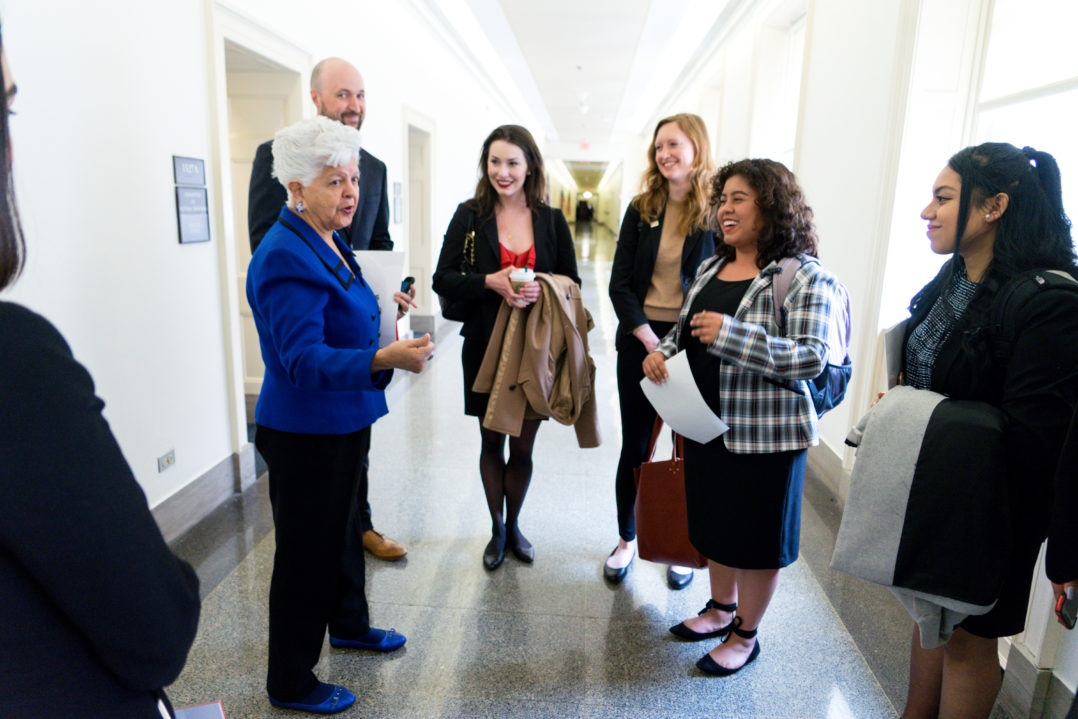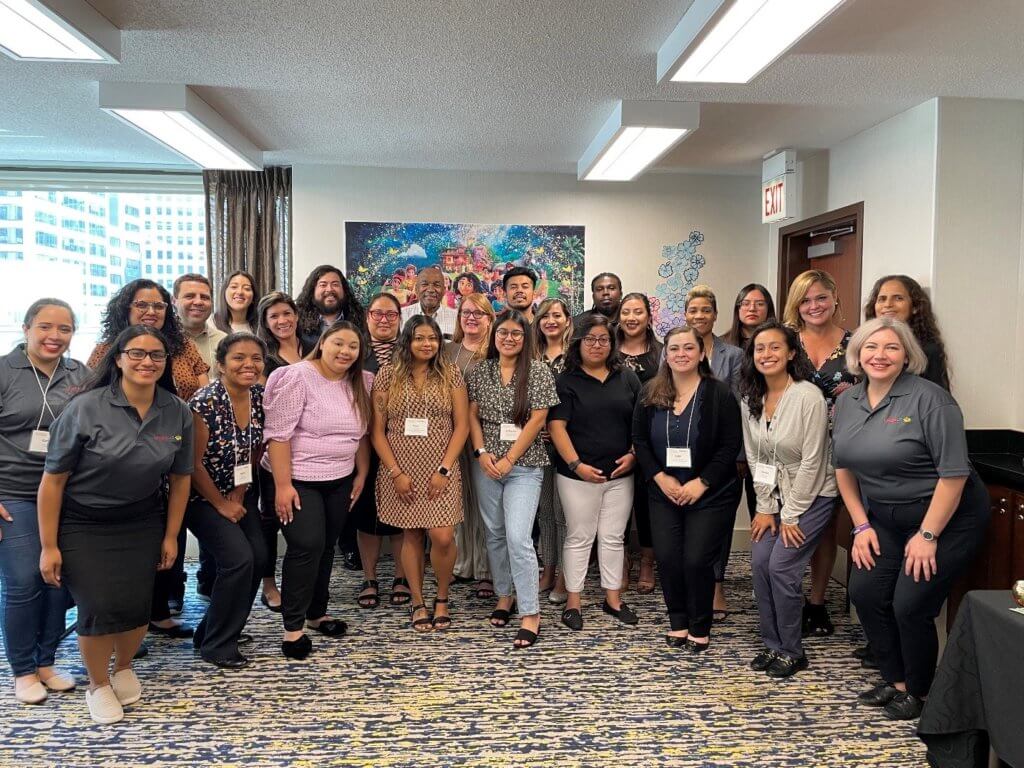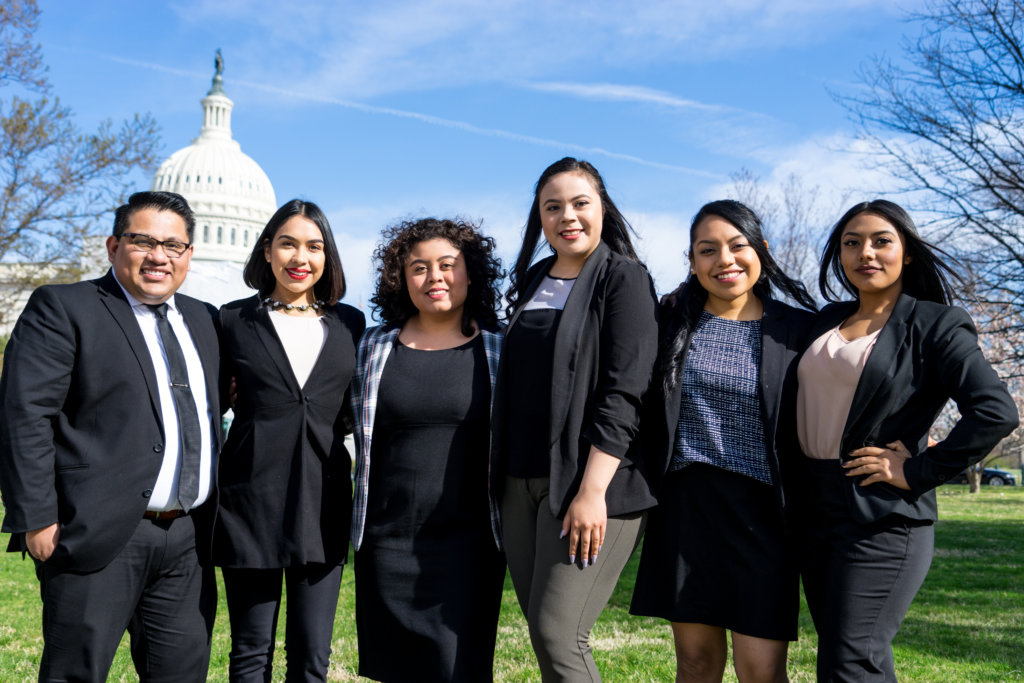Líderes Avanzando Fellows Blaze a Trail on Capitol Hill for Next Year’s Cohort

By Cayla Conway, Education Outreach Manager, UnidosUS
The ping of my coworker’s smart watch indicated that we had achieved 10,000 steps, even though it was only 2:00 in the afternoon. On any other day, walks with her dog, trips to the grocery store, and laps around the office would make this achievement less than noteworthy. But the steps on this crisp day in April, consisted of pounding hard, white marble down long hallways to tall wooden doors, framed by colorful standing flags, and bronze placards with the names of politicians representing districts from across the country.
Early that morning, we, along with six college students had begun a trek around Capitol Hill in Washington, DC. Our mission? Attend a series of meetings with the elected officials of each youth’s state, to discuss the latest social, economic, and political issues impacting their communities, and some possible policy and programmatic solutions.
For many of them, it was their first time meeting with their congressmen and staff—let alone being on Capitol Hill—yet they were prepared. A visit to Capitol Hill represented the final activity of their year-long fellowship with UnidosUS’s Avanzando Fellowship. This year-long program is geared toward first-generation, low income second- and third-year college students who are passionate about making meaningful change on their college campuses and beyond.
Throughout three Washington, DC-based training modules focused on bolstering their analytical, public speaking, and writing skills, fellows identify an issue, explore its root causes and policy solutions, develop writing and public speaking skills, and meet with their member of Congress. The program provides an avenue through which fellows can elevate student voices to the forefront of conversation, moving thought into action and changing the narrative about Latino youth. So far, 19 young advocates have graduated from the program since 2017.
As the leader of this program, I help the students develop their advocacy strategies around their issues by collaborating with topical experts, providing support on the fellowship’s assignments, like blog posts, policy memos and presentations, and planning the in-person training modules in Washington, DC.
These young advocates come from across the country, studying at public and private universities in New York, Oklahoma, Texas, Arizona, and California. Most of them have a background in political science, however, it is by no means a requirement for participating in the program. In fact, they came with varying levels of advocacy experience. Some had just begun their journey, while others were several steps along, working on their issues for years prior. Wherever they were in the journey, they had all identified an issue for which they were passionate and trained throughout the year to invoke the change they wish to see.

Following their year of workshops and research and writing assignments, the 2018-2019 cohort arrived on Capitol Hill carrying policy memos addressing their concerns and proposed solutions for asylum seekers, DACA recipients, college homelessness, sexual assault, youth civic engagement among Latino immigrants, and, in a similar vein, service learning programs for underserved youth.
By the end of their final trip to Washington, the ground they covered went well beyond a daily steps routine. Working individually, as a group, and in collaboration with UnidosUS staff, they provided a much-needed voice for a wide array of under-represented communities, leaving what I believe were lasting impressions on powerful policymakers.
“It gave me a platform to talk to my congresswoman about things that matter to me,” said 2018-2019 Avanzando fellow Brenda Lozano, who told Congresswoman Kendra Horn (D-OK) that she wanted to see mandatory civic engagement training in high school curriculums.
Her colleague Carla, who also pushed an agenda of greater civic engagement among immigrants, couldn’t agree more.
“How are you going to build a coalition, how are you going to work with students to pursue that vision and how can you collectively create a theory of change?” asked Carla Mendoza, an Avanzando fellow from Columbia University who has been working to get college students involved in efforts to improve conditions for asylum seekers in detention.
For Diana K. Rocha Ramos, an Avanzando Fellow from St. Mary’s University in Texas, her own Avanzando colleagues were a great sounding board for her proposal to train college students to recognize and respond to incidents of sexual harassment or assault—as potential victims and bystanders.
“Sometimes it might seem that because we are young, or we’re still pursuing our education, we don’t have a voice, but we do. It’s as easy as calling your representative, becoming involved in your community through community service, or joining organizations like UnidosUS,” she said.
As the fellowship comes to an end and their semesters close out, some of ourAvanzando graduates are already making plans to continue advocating for their causes over the summer and beyond. Now it is our job to keep that momentum going by recruiting a new cohort of students. As the Avanzando fellowship enters its third year, I’m excited to think about the impact our growing number of alumni are making as foot soldiers in their communities, and how their many collective steps have blazed a trail that will allow our new fellows to hit the ground running.




